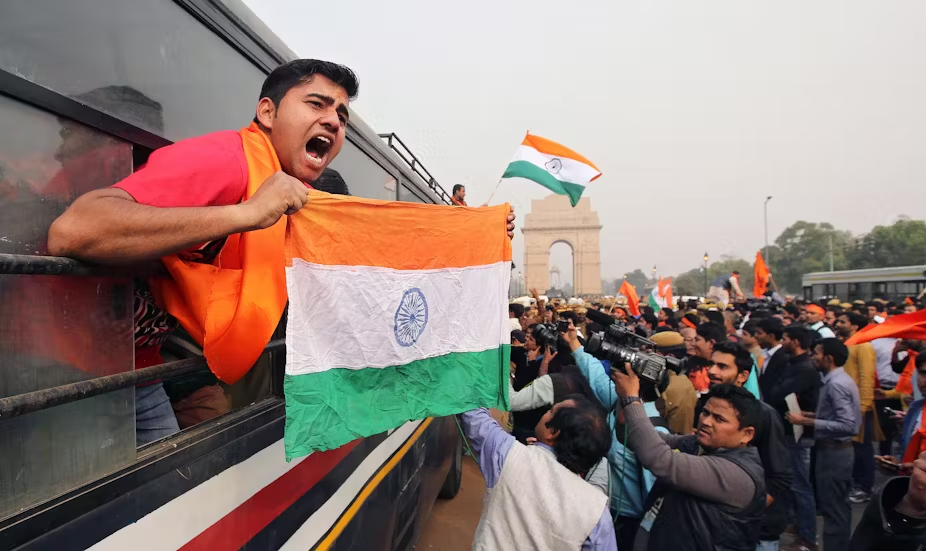The portrayal of India and its political landscape in Western media often reveals a significant bias that unfairly labels patriotic Indians as “Hindu nationalists” while downplaying or dismissing concerns about Islamic militancy as “Islamophobia.” This stark contrast in narrative reveals a double standard that not only misrepresents India’s sociopolitical reality but also perpetuates misconceptions about the country’s foundational values and historical context.
Western Nationalism vs. Indian Patriotism
Western countries, particularly those in Europe and North America, exhibit a form of nationalism that is widely accepted and often celebrated. Patriotism in these regions is seen in public displays of national pride, military parades, and a general endorsement of national identity. This is seen as a legitimate expression of cultural and national solidarity. In contrast, when similar expressions of national pride occur in India, particularly those that highlight Hindu cultural heritage, they are often dismissed as “Hindu nationalism.”
This discrepancy becomes glaring when considering the historical context and political frameworks of these regions. Western nationalism has roots in colonialism and expansionist policies, which have led to global conflicts and wars. Many of these nations, such as Germany and Italy, have histories deeply intertwined with fascist ideologies. Despite this, modern expressions of nationalism in these countries are generally not scrutinized to the same extent as Indian nationalism.
The Mislabeling of Hindu Patriotism
India’s independence movement, led by figures like Mahatma Gandhi, was deeply rooted in the principles of peace and non-violence. India has a long history of pluralism and has never invaded another country. However, the rise of the Bharatiya Janata Party (BJP) and the leadership of Prime Minister Narendra Modi have been labeled as “Hindu nationalist,” suggesting a form of exclusionary and aggressive nationalism.
This labeling ignores the broader context of Indian society, where Hinduism is not just a religion but a way of life that influences the cultural and social fabric of the nation. The BJP’s emphasis on Hindu values is often a reflection of this cultural heritage rather than an exclusionary political stance. Moreover, it overlooks the party’s development agenda and efforts to uplift all sections of society, irrespective of religion.
The Issue of Islamic Militancy and Islamophobia
On the other hand, the Western media tends to underreport or downplay instances of Islamic militancy in India, labeling concerns over such issues as “Islamophobia.” This term, originally intended to address genuine discrimination against Muslims, has been co-opted to shut down legitimate security concerns and discussions about radicalization.
India has been a victim of numerous terrorist attacks orchestrated by Islamic militant groups. The 2008 Mumbai attacks, the 2001 Parliament attack, and ongoing insurgency in Kashmir are stark reminders of the threat posed by Islamic extremism. These incidents are often reported with a cautious tone, avoiding terms that might be deemed offensive or politically incorrect in the West. This selective reporting fails to acknowledge the complexities and security challenges faced by India.
Western Media Bias and Hypocrisy
The Western media’s bias is further highlighted by their own countries’ stringent security measures and surveillance programs targeting Islamic militancy. Nations like the United States, the United Kingdom, and France have robust counter-terrorism frameworks in place, including surveillance, profiling, and military interventions in the Middle East. These actions are justified as necessary for national security. However, when India takes similar measures to protect its citizens, it is often criticized as being repressive or discriminatory.
The Reality of India’s Foundational Values
India’s foundational values are enshrined in its constitution, which guarantees equal rights and freedom to all citizens, regardless of religion. The country’s secular framework ensures that all religions are treated with equal respect. However, the persistent labeling of Indian patriotism as “Hindu nationalism” undermines this reality and paints a distorted picture of the nation’s ethos.
Furthermore, the Indian military, one of the most disciplined and professional forces in the world, operates under the principle of civilian supremacy and has never staged a coup or taken over the government. This adherence to democratic norms is in stark contrast to the often military-dominated political landscapes in several other countries.
The Need for Balanced Reporting
To foster a more accurate understanding of India, it is crucial for Western media to adopt a balanced approach in their reporting. Recognizing the legitimate security concerns posed by Islamic militancy without dismissing them as Islamophobic and acknowledging the cultural context of Hindu patriotism can lead to a more nuanced and fair portrayal of India.
India’s path to development and its fight against terrorism should be viewed with the same respect and objectivity as similar efforts in Western nations. Dismissing Indian concerns as nationalist or bigoted while accepting Western measures as necessary security protocols reveals a deep-seated hypocrisy.
Conclusion
The Western media’s portrayal of Indian patriotism as “Hindu nationalism” while labeling concerns over Islamic militancy as “Islamophobia” underscores a significant bias that misrepresents India’s socio-political reality. Acknowledging this double standard is the first step towards more fair and balanced reporting. Recognizing India’s commitment to democracy, peace, and secularism, despite its challenges, can help in building a more accurate and respectful global narrative.
India, a country founded on principles of non-violence and pluralism, deserves a portrayal that reflects its true character. By understanding the historical and cultural contexts, and avoiding biased terminologies, the Western media can contribute to a more informed and balanced global dis





